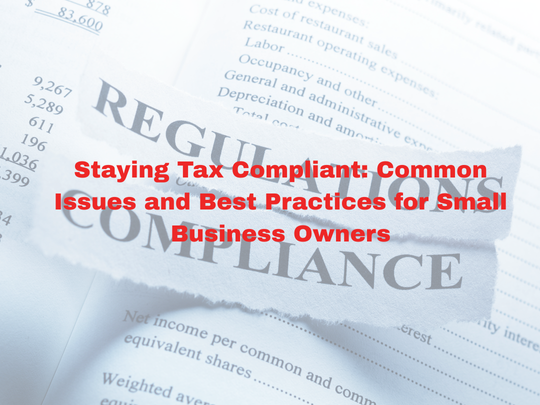Planning for Next Tax Season: Proactive Tips for Small Businesses
Tax season can be particularly daunting for small business owners, who must navigate a complex landscape of deductions, credits, and regulations. However, with proactive planning, you can simplify the process and ensure your business is prepared. Here are some essential tips to help small businesses get ready for the next tax season:
1. Maintain Accurate Financial Records
Keeping accurate and detailed financial records is crucial for small businesses. Implement a system for organizing receipts, invoices, and other financial documents. Consider using accounting software like QuickBooks or Xero to streamline this process and ensure everything is up-to-date and easily accessible.
2. Track Business Income and Expenses
Regularly monitor your business income and expenses. This includes all revenue streams, such as sales, services, and investments, as well as expenses like rent, utilities, supplies, and payroll. Detailed records will make it easier to identify deductible expenses and provide a clear picture of your business’s financial health.
3. Understand Your Deductions and Credits
Small businesses have access to a variety of deductions and credits that can reduce their tax liability. Common deductions include business-related travel, office supplies, and employee benefits. Credits like the Small Business Health Care Tax Credit can also provide significant savings. Consult with a tax professional to ensure you’re taking full advantage of these opportunities.
4. Review Your Payroll Practices
Ensure your payroll system is accurate and compliant with tax regulations. This includes correctly classifying employees and independent contractors, withholding the appropriate taxes, and filing payroll taxes on time. Payroll software can help automate this process and reduce errors.
5. Adjust Your Estimated Tax Payments
Small business owners often need to make estimated tax payments quarterly. Use Form 1040-ES to calculate these payments and avoid underpayment penalties. Set reminders for due dates to ensure timely payments and prevent cash flow issues.
6. Contribute to Retirement Plans
Setting up a retirement plan for yourself and your employees can provide significant tax benefits. Contributions to plans like a SEP IRA, SIMPLE IRA, or 401(k) can be deducted from your business’s taxable income, reducing your overall tax liability while helping secure your financial future.
7. Plan for Capital Expenditures
If your business plans to invest in new equipment or property, consider the timing of these purchases. Section 179 allows businesses to deduct the full purchase price of qualifying equipment and software purchased during the tax year. Strategically planning these expenditures can optimize your tax savings.
8. Stay Informed on Tax Law Changes
Tax laws affecting small businesses are subject to change. Stay informed about new regulations and updates that may impact your business. Subscribe to IRS newsletters, follow financial news, and consider consulting with a tax professional to stay updated on the latest developments.
9. Consult a Tax Professional
Working with a tax professional who specializes in small businesses can provide invaluable insights and strategies tailored to your specific situation. They can help you identify deductions you might have missed, ensure compliance with tax laws, and provide guidance on tax planning strategies.
10. Review and Reconcile Financial Statements
Regularly review and reconcile your business’s bank and credit card statements to ensure all transactions are accurate. This practice helps identify discrepancies or fraudulent activities early on, making it easier to address them before tax season.
11. Keep an Eye on Cash Flow
Effective cash flow management is crucial for meeting tax obligations. Monitor your cash flow regularly to ensure you have enough funds to cover estimated tax payments, payroll, and other expenses. Consider setting aside a portion of your income specifically for taxes to avoid last-minute cash shortages.
By implementing these proactive tips, small businesses can approach the next tax season with confidence and ease. Consistency and organization throughout the year are key to successful tax planning. Start now, and you’ll thank yourself when tax season arrives. Don’t hesitate to contact our office so we can assist you as you prepare for the next tax season.




